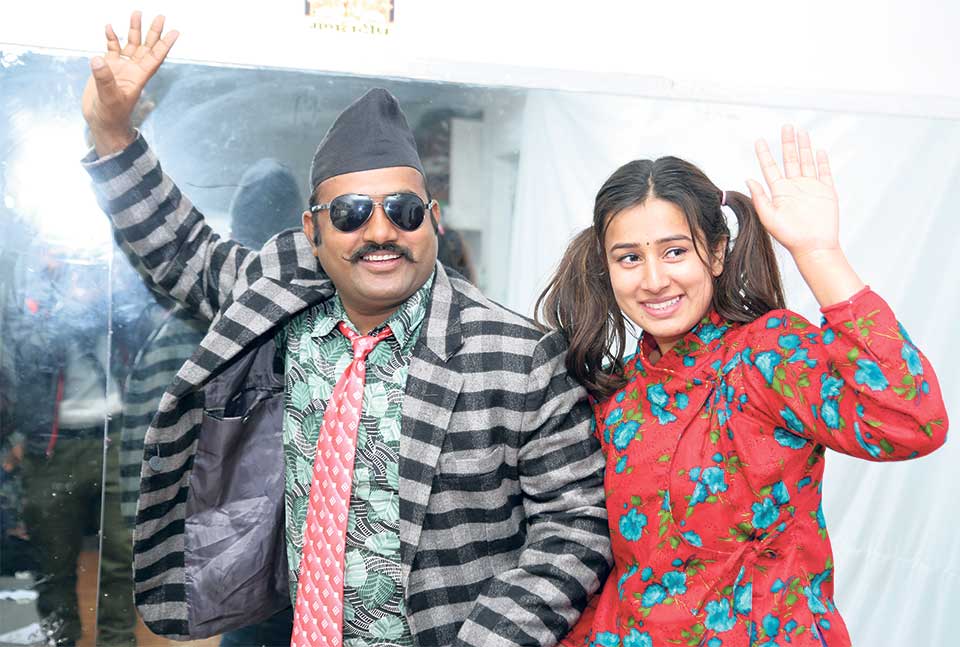
OR

Prem Poudel was addicted to travelling. He travelled not for fun but to understand different lifestyles and various traditions around the globe. Exploring different cultures has always been his passion. But every time he introduced himself as a Nepali citizen he got confounding reactions from people. “Where is this country?” was one of the most common questions asked.
That’s when he realized that, in a quest to understand others, he had left his own rich heritage behind. Like most Nepali youth, even he had forgotten his own valuable traditions and that had, in a way, deprived him of his own identity.
“While our neighboring countries were known for their cultural lineage, Nepal had almost become invisible. Most people I met did not even know that there was a country called Nepal,” says Poudel, founder of Lok Dhrishti Theater and producer/director of the play ‘Sattu ko Katha’. “I decided to do something to preserve Nepal’s identity. The only way I could do it was by displaying our rich heritage through theater,” he adds.
Since then, he has already won several awards for his productions such as Lambari Laale, Khalifa Tower, Abhagni Ama and Chiple Dhunga. “One of my most cherished moments was the time when our drama won the best social drama award in a Russian competition named Theater Chekhov Yalta,” says Poudel. Today, he has scripted, directed, produced and acted in numerous plays and workshops all over the world. “Drama gives me immense happiness and my only purpose in life if to promote Nepali culture through drama,” says Poudel.
A folk story
Sattu ko Katha, a story similar to ‘A Milk Maid’s Dream’ is one of the most popular folk stories in Nepal. Poudel produced and directed this play in his quest to preserve folk tales and make them known to the younger generation.
“In the past our folk tales were mostly transferred from gurus (teachers) to students. These anecdotes were not only for entertainment but also gave important life lessons. Sattu ko Katha is one of such stories. Its moral is, do not build castles in the air,” says Prabhakar Neupane, the protagonist of the play. Neupane is a Sette Jogi or a priest in the play who fools others with his scams.
Through his character, the play mocks superstitious beliefs deeply entrenched in our society. The satirical comments made by this priest also gives a deep insight as to how most of our country men run towards making easy money.
Realities such as child marriage and domestic violence have also been reflected through the play. “My character reflects on how many young girls in the villages have internalized the fact that they need to get married by the age of 12. Although not legal, these practices still persist in Nepal,” says Shakshi Lamsal. Her character also desires to give birth at a tender age. The characters’ inability to understand the institution of marriage conveys an important message.
“It was extremely difficult to play this character. I had to change my voice and even the tone in which I speak. Although challenging, it has been a wonderful experience,” says Lamsal.
Basudev Khanal, who is Lamsal’s father in the play, is a landlord at the village. Through his character, this play takes you back to those times when landlordism was prevalent in Nepal.
“On one hand my character displays the arrogant lifestyle of a landlord, and on the other hand it also shows the societal pressures of getting our daughters married,” says Khanal.
Pushpa Raj Awasthi is playing Pital Kumar, one of the most interesting and the funniest characters in the play. “My character shows how most Nepali youths are migrating abroad and working very hard there. If they work as much in Nepal, they can definitely prosper in their own country,” says Awasthi whose comical role is guaranteed to make the audience laugh as well as imparts a strong message at the same time.
Alluring music
Madal, sarangi and an authentic folk song have been incorporated in this play. “While preserving these folk stories, we also want to preserve the local instruments of Nepal. That is why a platform such as this is necessary,” says producer Poudel. Previously, stories and messages used to be conveyed from one village to another and one generation to the next through songs. This play has tried to emulate and revive the same culture and present it before the audience.
Khum KC, a sarangi player, is glad that he is a part of this theatrical performance. “I’m very happy that I got this platform. I’m sure this will inspire our younger audience to learn and promote our folk instruments,” concludes KC.
The play will be staged at Shilpee Theater in Battisputali from January 25, 2018.
You May Like This

Silent period' is time for voters, candidates and EC to reflect upon: Experts
KATHMANDU, May 11: The 'silent period' that begins 48 hours before the polls open in an election is the time... Read More...

Full time lawyer, part time youtuber
You might have come across Random Nepali. He’s a youtuber who makes presentation like animation videos that lists Nepali eccentricities... Read More...





Just In
- CM Kandel requests Finance Minister Pun to put Karnali province in priority in upcoming budget
- Australia reduces TR visa age limit and duration as it implements stricter regulations for foreign students
- Govt aims to surpass Rs 10 trillion GDP mark in next five years
- Govt appoints 77 Liaison Officers for mountain climbing management for spring season
- EC decides to permit public vehicles to operate freely on day of by-election
- Fugitive arrested after 26 years
- Indian Potash Ltd secures contract to bring 30,000 tons of urea within 107 days
- CAN adds four players to squad for T20 series against West Indies 'A'













Leave A Comment